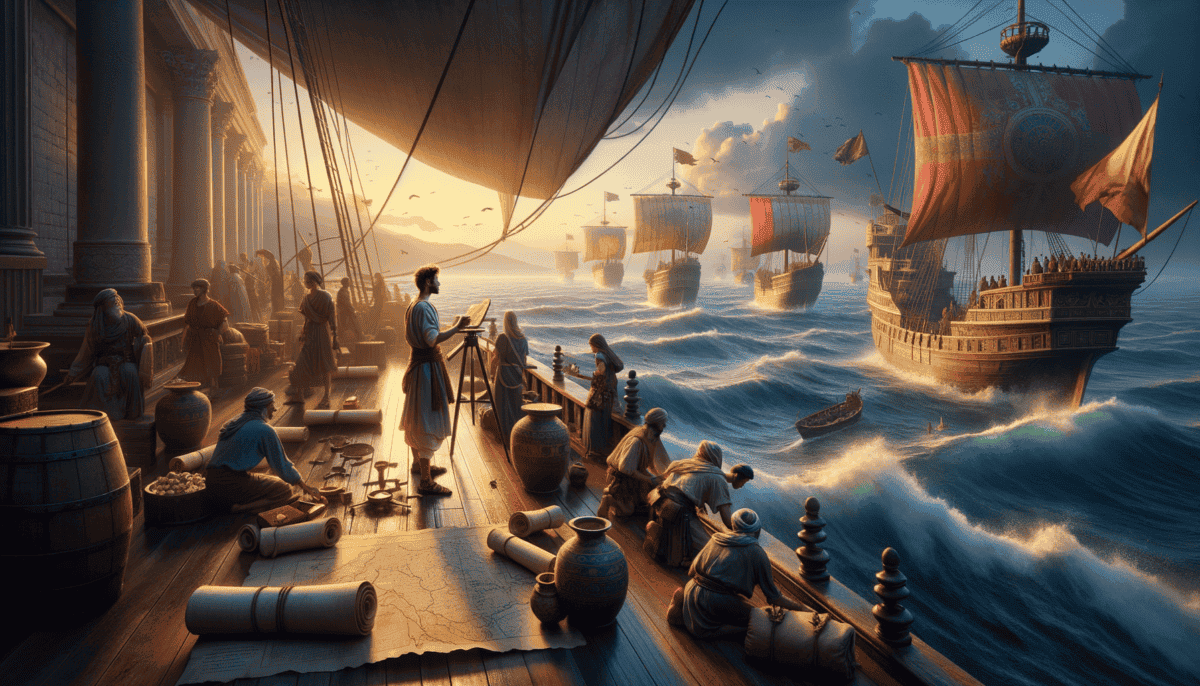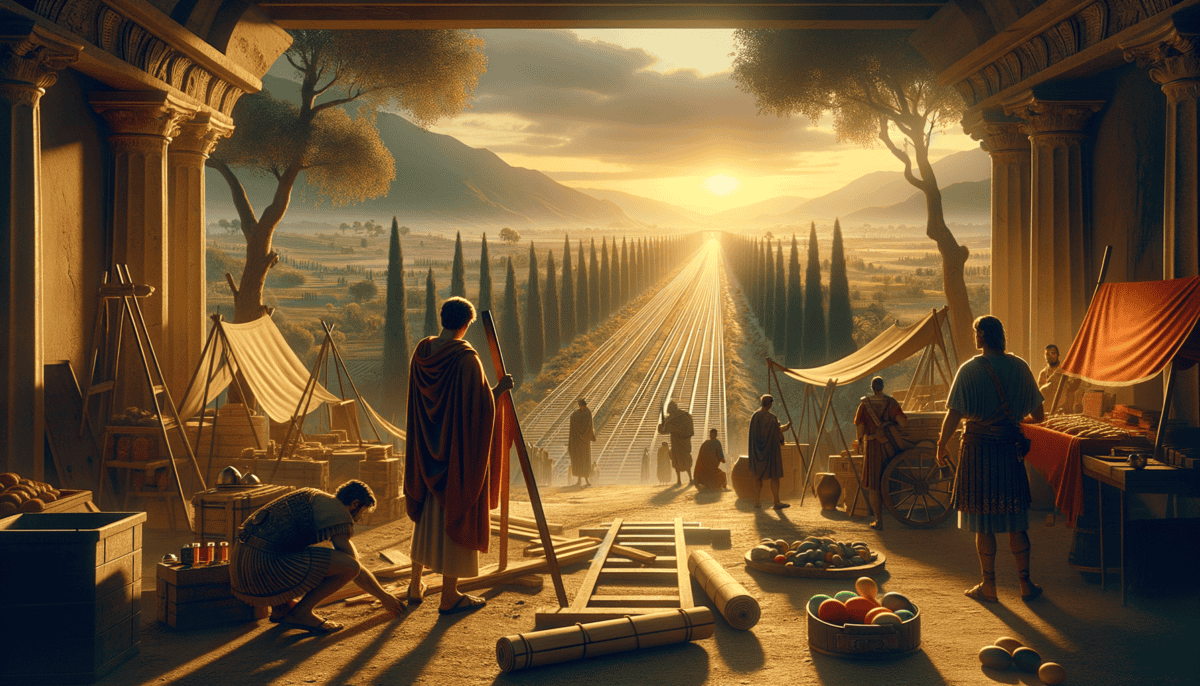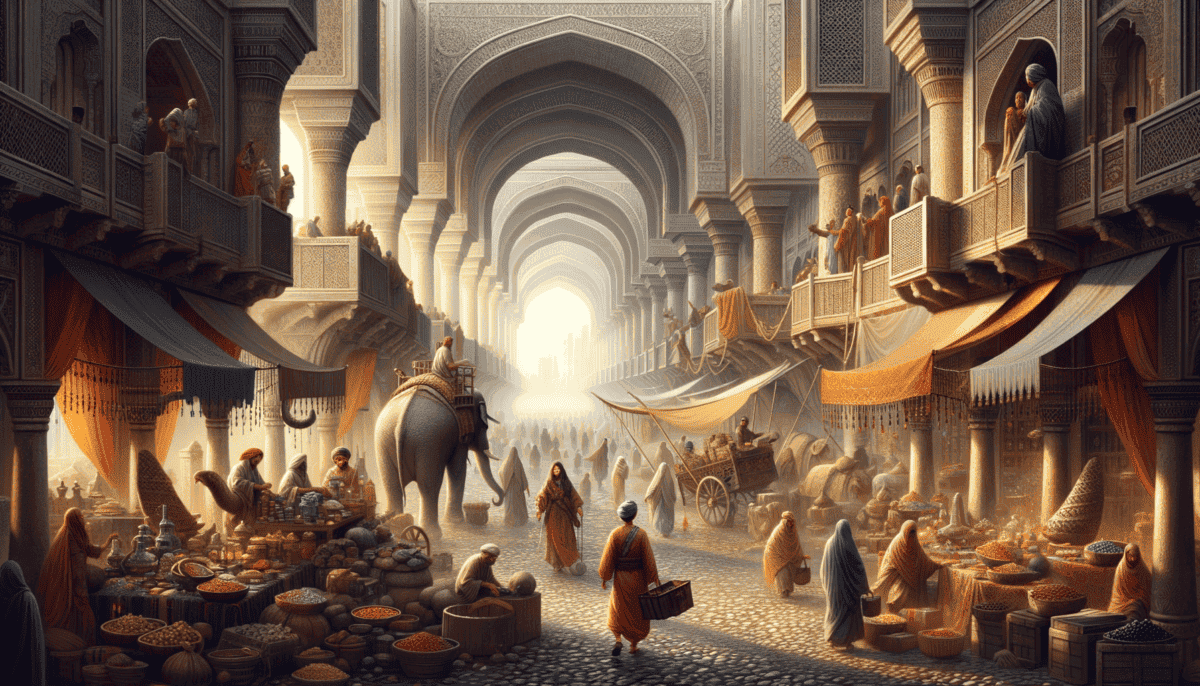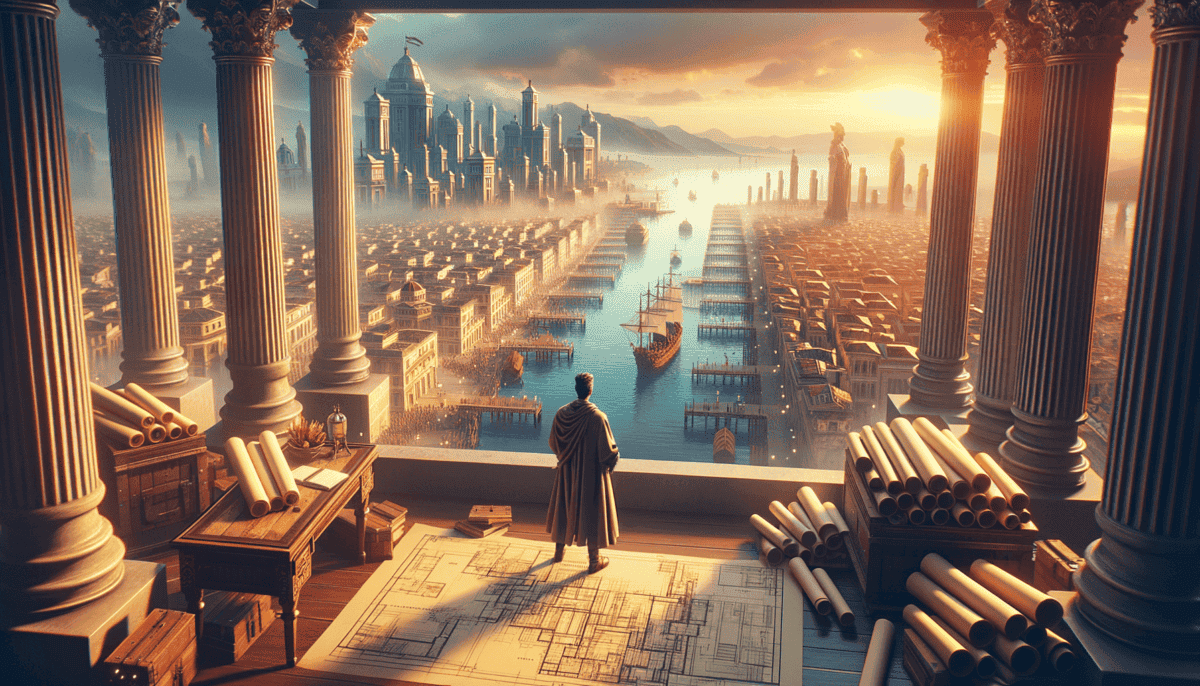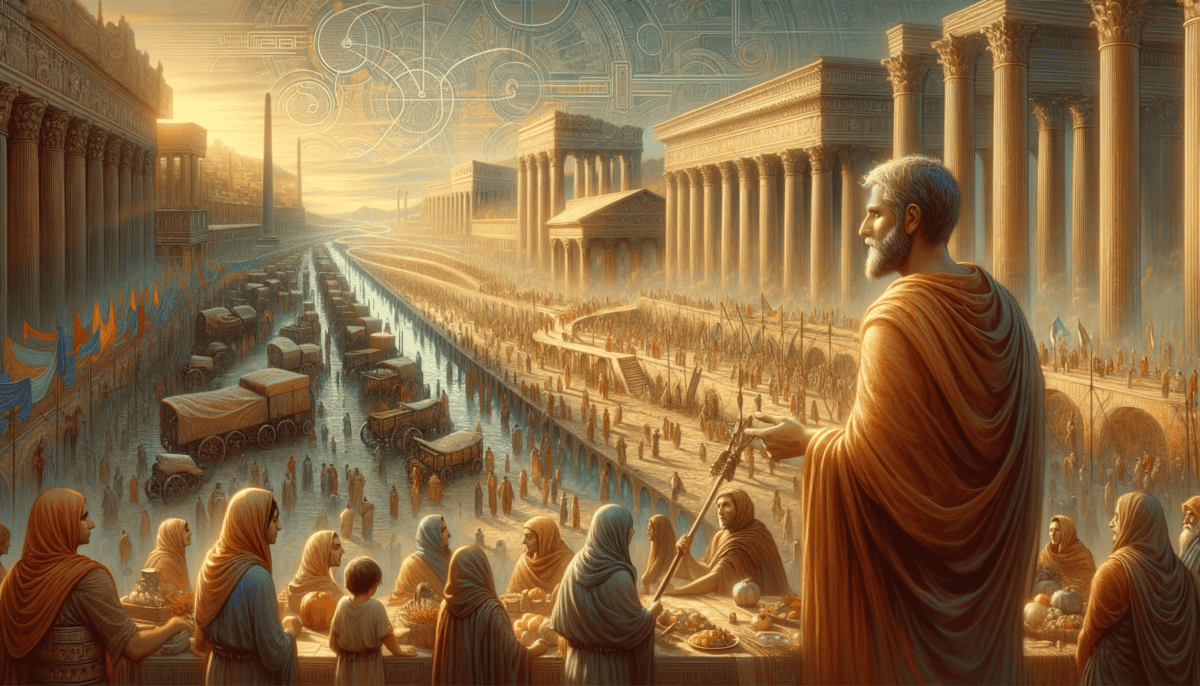The Merchant’s Journey Begins
Marcus wiped sweat from his forehead as he counted clay jars of olive oil. The morning sun warmed the stone warehouse in Rome's busy port of Ostia. At twelve years old, he was finally old enough to join his father's trading business.
"One, two, three…" Marcus carefully marked each jar on his wooden tablet. The sweet smell of olive oil filled the air.
His father Lucius appeared in the doorway, his red merchant's toga bright in the sunlight. "How's the counting coming along, son?"
"Almost done, Father! We have thirty jars ready for the journey." Marcus beamed with pride.
Lucius nodded approvingly. "Good work. But trading takes more than just counting. Let me show you something important."
They walked to a large map painted on the warehouse wall. It showed the vast Roman Empire with squiggly lines crossing land and sea.
"These are our trade routes," Lucius explained, tracing a line with his finger. "We'll take our olive oil north to Gaul and bring back their famous wool and cheese."
Marcus's eyes widened. "That's so far! How will we get there?"
"First by sea, then by road. The Romans built special roads called viae all over the empire. They're like stone highways!"
The boy bounced with excitement. "When do we leave?"
"Tomorrow at dawn. But first, we need to prepare. A good merchant always plans ahead."
Together, they made a list of everything they needed:
• Warm clothes for cold weather
• Food for the journey
• Money in different coins
• Maps and trading papers
• Strong ropes for tying cargo
As the sun set, Marcus helped load the last supplies onto their cart. His mother Claudia appeared with a small package.
"For good luck," she said, handing him a leather pouch. Inside was a tiny bronze statue of Mercury, the god of merchants.
That night, Marcus could hardly sleep. He imagined all the adventures ahead – sailing across blue waters, traveling on famous Roman roads, and meeting traders from distant lands.
Before dawn, the port came alive with activity. Sailors called to each other as ships prepared to leave. The smell of salt water mixed with fresh bread from nearby bakeries.
"Ready?" Lucius asked, adjusting Marcus's new traveling cloak.
Marcus touched his Mercury statue and nodded. His first trading journey was about to begin. He didn't know it yet, but this trip would change his life forever.
As their ship sailed into the golden sunrise, Marcus watched Rome's harbor shrink behind them. The great adventure of becoming a Roman merchant had finally begun. New lands, new people, and new challenges waited beyond the horizon.
“Remember son,” Lucius said softly, “a good merchant makes more than just money – he builds bridges between people and places.”
The salty breeze ruffled Marcus's dark hair as he stood at the ship's rail. He was no longer just a boy from Rome – he was now a merchant's apprentice, ready to learn the secrets of trade that helped build the greatest empire in the world.
Across Mediterranean Waters
The morning sun sparkled on the waves as Marcus gripped the ship’s rail. The gentle rocking made his stomach feel funny.
“First time at sea?” asked Flavius, the old ship captain. His skin was brown from years in the sun.
“Yes, sir!” Marcus tried to sound brave. “How long until we reach Gaul?”
“If Neptune smiles on us, five days. But first, we have other stops to make.” Flavius pointed to a map.
• Corsica Island – for wine
• Sardinia – for silver
• Massilia Port – final stop in Gaul
The big sailing ship moved smoothly through blue waters. Marcus watched dolphins jump beside them.
“Look there!” Lucius pointed to other ships in the distance. “Those are Greek traders. We’ll meet them at the next port.”
Marcus saw colorful flags on the other boats. “How do we talk to them if they speak different languages?”
“Watch and learn, son. Trading has its own language – the language of bargaining!”
At sunset, they reached Corsica. The harbor was busy with boats from many lands. Marcus saw traders with strange clothes and heard words he didn’t understand.
“Remember,” his father whispered, “always show respect. Every trader has something valuable to teach us.”
A Greek merchant approached their ship. He wore a purple robe and lots of rings.
“Welcome, friends!” he said in broken Latin. “I am Alexandros. I hear you have fine Roman olive oil?”
Marcus watched carefully as his father negotiated. They traded five jars of oil for three barrels of sweet Corsican wine.
“Your turn,” Lucius nudged Marcus forward when another trader came.
Marcus’s heart beat fast. The trader wanted two jars of oil. Following his father’s example, Marcus held up three fingers, then slowly lowered them to two as they bargained. The trader smiled and agreed!
“Well done!” Lucius patted his back. “You’re learning fast.”
That night, a storm hit their ship. Rain poured down and waves crashed over the deck. ⛈️
“Don’t worry,” Flavius assured them. “I’ve sailed these waters for thirty years. The goddess Venus will protect us.”
Marcus clutched his Mercury statue and prayed. By morning, the storm had passed. He had survived his first sea challenge!
In Sardinia, they traded wine for shining silver bars. The local traders taught Marcus a fun dice game, and he learned to count in Greek.
Finally, they reached Massilia in Gaul. The port was huge, with hundreds of ships from all over the empire.
“This is where the sea route ends,” Lucius explained. “Tomorrow, we start our land journey on the Roman roads.”
Marcus could hardly wait. He had learned so much already – how to bargain, navigate by stars, and make friends with traders from far away. But the biggest adventures still lay ahead, waiting on the famous Roman roads. ️
That evening, looking at the sunset over Massilia’s harbor, Marcus felt different. He wasn’t just a boy anymore. He was becoming a real Roman merchant, ready to explore the great trading routes of the empire.
Roads of the Empire
Marcus took his first steps on the famous Roman road. The smooth stone blocks fit together perfectly, stretching as far as he could see. ️
“Amazing!” he said, tapping the stones with his sandal. “They’re so flat!”
“These roads are the heart of our empire,” Lucius explained. “Built by the finest engineers in Rome.”
• Made with layers of stone
• Built slightly raised for rain to run off
• Has mile markers called “milestones”
• Protected by Roman soldiers
Their wagon joined a long line of traders. Marcus saw carts full of wool, grain, and shiny metals. Some people rode horses, while others walked like them.
“Look!” Marcus pointed to soldiers marching nearby. Their red capes and shining armor gleamed in the sun. ⚔️
“The roads help our army move quickly,” Lucius said. “That’s why they’re so well protected.”
At midday, they stopped at a roadside inn called a “mansio.” The innkeeper gave them fresh bread and cool water.
“Every day, hundreds of traders pass through here,” the innkeeper said proudly. “From Britain to Egypt, we’re all connected by these roads!”
Suddenly, they heard shouting. A group of merchants ran past, looking scared.
“Bandits ahead!” someone yelled. “They’re stopping wagons!”
Marcus’s heart raced. But his father stayed calm.
“Don’t worry,” Lucius smiled. “Watch this.”
He walked to the Roman soldiers they’d seen earlier. After a quick talk, the soldiers rode ahead to chase the bandits away.
“See?” Lucius winked. “That’s why we pay taxes – to keep the roads safe.”
As they walked, Marcus noticed stone markers every mile. Numbers showed how far they were from Rome.
“These help traders know exactly where they are,” Lucius explained. “No getting lost on Roman roads!”
They met a trader from Britain who sold them warm wool blankets. Then they traded olive oil to a merchant from Greece for beautiful pottery.
“The roads make it easy to trade with people from everywhere,” Marcus realized.
That night, they slept at another mansio. Marcus met a boy his age named Gaius, whose family traded in silver.
“Want to see something cool?” Gaius pulled out a map. It showed all the main roads in the empire, spreading out like a spider web from Rome. ️
“One day,” Marcus told his new friend, “I’ll travel every single one of these roads!”
The next morning brought excitement. They were joining a large trading caravan heading east.
“The eastern routes are where the real treasures are,” Lucius said with a twinkle in his eye. “Silk, spices, and things you’ve never seen before!”
Marcus couldn’t wait. The Roman roads had already shown him so much, but he knew bigger adventures waited on the path ahead. His father was right – these amazing roads really were the heart of their mighty empire.
As the sun rose higher, Marcus shouldered his pack. The smooth stones stretched before him like a ribbon, leading to new wonders in the east.
Eastern Connections
The morning sun painted the sky orange as Marcus and his father joined the eastern caravan. Ahead lay the mysterious lands of silk and spices.
“Look at all these different people!” Marcus whispered excitedly.
The caravan was full of traders from far places. Some wore colorful robes and spoke languages Marcus had never heard before.
• Silk from China
• Spices from India
• Perfumes from Arabia
• Precious stones from Persia
A tall man in flowing silk clothes approached them. “I am Chen Wei, from the land of Han,” he said in broken Latin. “You trade?”
Marcus’s eyes widened at Chen Wei’s silk robes. They shimmered like water in the sun. ✨
“Yes!” Marcus replied eagerly. “We have olive oil and wine from Rome.”
Chen Wei smiled and opened his bags. Inside were rolls of silk in colors Marcus had never seen before.
“In my land, we make silk from tiny worms that eat mulberry leaves,” Chen Wei explained. “It takes many moons to make just one piece.”
They traded some wine for a small piece of blue silk. Marcus had never felt anything so soft!
Next, they met Aditi, a spice trader from India. She showed them tiny bags full of wonderful smells.
“This is pepper,” she said, letting Marcus smell a black powder. “And this yellow one is turmeric. They make food taste amazing!”
Marcus sneezed when he smelled the pepper, making everyone laugh.
“Different people, different customs,” his father reminded him. “We must learn their ways to trade well.”
At lunch, they sat with traders from many lands. Everyone shared their food and stories.
“How do you say ‘thank you’ in your language?” Marcus asked Chen Wei.
“Xièxiè,” Chen Wei taught him. Marcus practiced until he could say it right.
From Aditi, he learned “Dhanyavaad.” From a Persian trader named Darius, he learned “Sepas.”
“Words are like bridges between people,” Lucius said proudly. “Just like these trade routes.”
That afternoon, they reached a busy trading post. Colorful tents filled the area, and the air smelled of exotic spices.
Marcus watched in amazement as people traded all sorts of things:
Roman glass for Persian carpets
Indian pepper for Greek silver
Chinese silk for Egyptian cotton
“Each thing comes from so far away,” Marcus realized. “But the trade routes bring them all together!”
A group of musicians played strange instruments, filling the air with new sounds. Traders danced and shared stories in many languages.
“Remember this, Marcus,” Lucius said softly. “Trade isn’t just about goods. It’s about sharing ideas, music, and friendship across the world.”
As the stars came out, Marcus sat with his new friends around a fire. Chen Wei taught him to use chopsticks. Aditi showed him how to wrap a turban. Darius drew Persian letters in the sand.
“Tomorrow,” Chen Wei announced, “we follow the Silk Road further east!”
Marcus couldn’t sleep that night, thinking about all the new wonders waiting ahead. The trade routes were like magical paths, connecting him to a world bigger than he’d ever imagined. ⭐
Under the starry sky, he practiced all the ways to say “friend” he’d learned that day, dreaming of the adventures still to come.
A Growing Empire of Trade
Marcus stood proudly in his new trading office in Rome. The shelves sparkled with treasures from his journeys: Chinese silk, Indian spices, and Persian gems.
“Look how far we’ve come,” Lucius smiled, placing a hand on his son’s shoulder.
The room buzzed with activity as workers counted coins and packed goods. Marcus had hired people from all the lands he’d visited.
“When I started, I only knew about Roman coins. Now we trade with money from all over the world!” Marcus exclaimed.
Chen Wei, who now ran Marcus’s eastern trade routes, entered with exciting news. “The silk boats have arrived!”
At the docks, Marcus watched his ships unload. Each one carried different goods:
• Five big ships
• Twenty trade wagons
• Shops in three cities
• Helpers from ten lands
“Remember your first trade?” Aditi asked, now his chief spice expert. “You sneezed at the pepper!”
Marcus laughed. “Now I sell more pepper than any other trader in Rome!”
The trading business had changed Rome. People wore silk clothes, ate spicy food, and used new tools from far away.
“Our city is richer because of trade,” Lucius explained to young traders learning from Marcus. “Not just in money, but in ideas too!”
Marcus showed them his favorite invention – a new kind of water wheel he’d learned about in Persia. It helped farmers grow more food.
“Trading isn’t just buying and selling,” he taught them. “It’s sharing what each land does best.”
That afternoon, Marcus visited the market he’d built. Shopkeepers from many lands sold their goods. The air smelled like spices and flowers.
“Xièxiè!” a Roman lady said to Chen Wei as she bought silk. Marcus smiled, remembering when he first learned that word.
In his counting room, Marcus looked at his trade maps. Red lines showed boat routes across the sea. Blue lines marked paths over land. The lines connected like a giant spider web. ️
“Each line is a path for new ideas,” he told his students. “When goods travel, knowledge travels too.”
Later, at home, Marcus wrote in his trade book. He used numbers from many lands and words in different languages.
“Your grandfather would be so proud,” Lucius said softly. “You’ve built something amazing.”
Marcus nodded. “And we’re still growing! Tomorrow, traders from Africa are coming. They have new things to trade!”
Outside his window, the sunset painted Rome’s buildings gold. The streets were full of people wearing clothes from far away, eating food from distant lands.
Marcus watched a group of children playing with toys from China. Their parents spoke in mixed languages, sharing stories from the trade routes.
“Our world gets bigger every day,” he thought happily. “And trade makes us all neighbors.”
That night, Marcus dreamed of new roads to build, new friends to make, and new things to learn. The trade routes were like bridges, and he was helping to build them stronger every day. ⭐
As he fell asleep, he could hear the night market below, full of voices from every corner of the world, all speaking the shared language of trade.
A Legacy of Connection
Ten years had passed since Marcus’s first trade journey. Now he stood at Rome’s biggest harbor, watching hundreds of ships come and go.
“Teacher Marcus!” called a young voice. Little Julia, his favorite student, ran up with excitement. “I made my first trade today!”
Marcus smiled warmly. “Tell me about it.”
“I traded Roman glass for Egyptian papyrus,” Julia beamed. “Just like you taught me – fair deals make friends!”
The harbor buzzed with activity. Traders from all over the world spoke in many languages. But they all understood each other through the language of trade.
• Trading schools in every big city
• Safe routes across land and sea
• Friends in faraway places
• Ways for different people to work together
“Remember when you thought the world ended at the edge of Rome?” Lucius chuckled, joining them at the harbor.
“Now I know it goes on forever,” Marcus replied, watching a Chinese ship dock. “And trade connects it all.”
Chen Wei appeared with his son, Li. “The silk road you helped build is now the busiest in history!”
Marcus watched as Roman children played games from Persia while eating sweets from India. Their parents wore silk from China and gold from Africa.
“Trade didn’t just make us rich,” Marcus told Julia. “It made us wise.”
That afternoon, Marcus visited his biggest achievement – the Trade Learning House. Here, young people from every land learned to be good traders.
“Knowledge is the best thing we trade,” he told his students. “It never runs out, and everyone gets richer from sharing it.”
Aditi, now running her own spice empire, taught a class about respect. “When we trade fairly, we make peace, not just money.”
Marcus watched proudly as Roman and foreign students worked together, solving problems and sharing ideas.
“You changed Rome,” Lucius said softly. “Now it’s not just the biggest empire – it’s the friendliest too.”
That evening, Marcus walked through the market he’d built years ago. It had grown into a small city where people from everywhere lived and worked together. ️
A group of traders stopped him to say thank you. They spoke many languages but shared the same smile.
Back home, Marcus looked at his old trade maps. The lines now reached every known land. But the real connections, he knew, were between people.
“Grandfather,” he whispered to the stars, “I did what you dreamed. I helped make a world where trade brings people together.” ⭐
Looking out over Rome’s twinkling lights, Marcus saw more than just a city. He saw a place where the whole world met to share, learn, and grow together.
Julia tugged at his sleeve. “What’s next, Teacher Marcus?”
He smiled. “There are always new routes to find, new friends to make, and new things to learn. The trade routes never end – they just keep growing, connecting more people every day.”
As night fell, the sounds of many languages filled the air. But Marcus heard one clear message: trade had turned strangers into friends, and the world was better for it.
The Roman trade routes would live forever, not just as paths for goods, but as bridges between people. And that, Marcus knew, was the greatest treasure of all.


